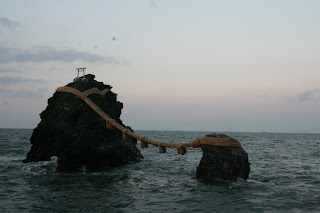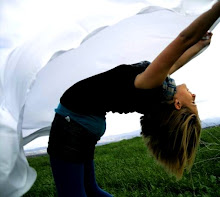
The tunnel of light at Nabana No Sato, a winter illuminations display.

The grounds of the Outer Shrine, one of the two Ise shrines in Ise city. These shrines are the most important Shinto shrines in the world so I was excited to see them. It was really crowded that day though!

The Meoto Iwa or the "wedded rocks," supposed to represent husband and wife (or as I like to say: partner and partner.) This is one of the main tourist attractions of Mie Prefecture and the Shima peninsula. We were here at sunset and it was absolutely gorgeous and tranquil. Coastlines and the sea, I have missed you so much.

In front of Nagoya castle in Nagoya. It's inside a big park across from City Hall. It's always super interesting to go to castles because they provide so much information on Japanese history. As Americans we have only about 300 years of history to learn about and conceptualize, but Japanese history goes back well over 10,000 years, so it's sort of mind-blowing to think about just how OLD this country is and how much so many aspects of Japanese life are quite rooted in ancient tradition.
---------
So, lately I've been experiencing uncharacteristic low energy.
This is normal for me in winter: my energy level lowers in winter every year. But this year, it's stronger than ever before. I still function fine at work, and I still have the energy to do things on weekends (as you can see from the above photos), but I have no desire to do anything else on weeknights other than come home, eat, and sit in bed all night. I never want to wake up, and I feel tired and/or hungry at frequent intervals throughout every day. It seems that no matter how much I eat or sleep, I can't get myself to feel the life-loving energy I felt so easily before. I am just going through the motions, but I'm not engaged, motivated, inspired. I don't feel negative at all (not sad or depressed) but just...lazy and tired. So why do I feel this way? Work isn't exhausting, so I know that's not the culprit.
A couple reasons I've thought of are:
I'm not exercising.
The cold here is colder than anything I have ever experienced and I am not used to it.
I miss my fulfilling social network of friends and family from back home.
I don't feel connected to my community here.
I am stressed about money.
I have very few outlets for artistic expression (no choir to sing in, no piano to play, no club to dance in, no place to perform.)
My voice is still weak and nodule-y and as such I can still barely sing (although it's much better than before.)
I know that as the weather warms up, I will naturally feel better. But my goal is to find a way to remedy my situation and my attitude using these reasons as a starting-off point. Whatever I can change, I will. And whatever I can't change, I won't worry about. I really want to dig in and feel engaged and inspired every day here!
---------
And now, to bring back a relic from the past:
*JAPANESE CULTURAL TIDBIT*
In my entries from Nagasaki, I frequently mentioned little interesting aspects I found about Japanese society. This time around, I feel like I can offer deeper social commentary than I could before. I'm going to try and move beyond the age of "they don't have public trash cans" and onto deeper insights that convey a more thorough understanding of Japanese culture, without generalization or stereotyping.
Thank-yous and Apologies
Thank-yous and apologies are thrown around like crazy here. There are many many ways to say either. This is an aspect of Japanese society which I fit into perfectly. Part of my personality is very eager-to-please and craves validation, so when I apologize, it makes me feel good to hear the "it's okay" from the other party. Japanese society highly values extreme apologetic-ness and gratefulness. When you receive a present, you say "sumimasen." When you accidentally bump someone on the train, you say "sumimasen." When you want to get someone's attention, you also say "sumimasen." In this way, "sumimasen" is an all-in-one combination of "thank you," "excuse me," and "I'm sorry." The three words (and intentions behind them) kind of blur together, because it is assumed that if a person is grateful, they will also feel guilt at making the other party do such a thing for them, and thus an apology is expected. Living in this world of politeness and gratitude is just another way in which all social actions are smoothed over, and conflict is avoided at all costs. A patron and an employee at a restaurant can respectfully argue over a bill just using these magic words of "I'm sorry" and "thank you" and acting appreciative and polite. They will not let their emotions show from underneath the veneer of their social politeness. (But that's a story for a different day.)
Japanese society also values extreme humility to the point of self-deprecation (of the self and of the family), which is something western culture criticizes but taken in the Japanese context, is not nearly as bad as you'd think. (It's not what you really think, it's just what to say to others to act humble.)

No comments:
Post a Comment